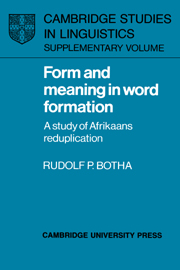
-
Select format
-
- Publisher:
- Cambridge University Press
- Publication date:
- February 2010
- March 1988
- ISBN:
- 9780511659447
- 9780521352604
- 9780521026130
- Dimensions:
- (228 x 152 mm)
- Weight & Pages:
- 0.47kg, 200 Pages
- Dimensions:
- (228 x 152 mm)
- Weight & Pages:
- 0.304kg, 200 Pages
You may already have access via personal or institutional login- Series:
- Cambridge Studies in Linguistics
Book description
This study of reduplication in Afrikaans provides a unified and principled analysis of an unusual and highly complex word formation process, shedding new light on the scope and content of various fundamental lexicalist principles of word formation. Surprisingly, Rudolf Botha concludes that the principles involved in Afrikaans reduplication are not unique to Afrikaans, as has often been thought, and are used by many other languages. Moreover, the interpretation of Afrikaans reduplications depends on principles of conceptual structure that are restricted neither to Afrikaans nor to the interpretation of reduplications, thus supporting recent work on cognition and meaning undertaken by Ray Jackendoff and other scholars. In analysing the data, Professor Botha has also provided a concrete illustration of how the Galilean style of linguistic inquiry can fruitfully be applied in the study of word formation and meaning. The study thus represents an important theoretical and methodological advance which will be of as much interest for its method of inquiry and argumentation as for the fresh insights it provides for scholars and researchers in the fields of morphology, word formation and semantics.
Contents
Metrics
Altmetric attention score
Full text views
Full text views help Loading metrics...
Loading metrics...
* Views captured on Cambridge Core between #date#. This data will be updated every 24 hours.
Usage data cannot currently be displayed.
Accessibility standard: Unknown
Why this information is here
This section outlines the accessibility features of this content - including support for screen readers, full keyboard navigation and high-contrast display options. This may not be relevant for you.
Accessibility Information
Accessibility compliance for the PDF of this book is currently unknown and may be updated in the future.


